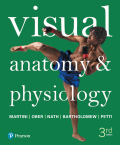
Concept explainers
Introduction: Amino acids are the building blocks of proteins. They are synthesized by the specific sequence of nitrogenous bases during translation. These amino acids combine to code for specific proteins that are involved in various biochemical processes.
Answer to Problem 1CRQ
Correct answer: Option c) “11”
Explanation of Solution
Reasons for the correct answer:
Option c) is given as “11”.
Peptides are short chains of amino acid monomers that are linked by peptide bonds. Peptide bonds are formed between the carboxyl group of one amino acid and the amino group of another amino acid. Two amino acids form dipeptide through 1 peptide bond. Hence, 2 amino acid = 1 peptide bond, this means “n” peptide bonds of polypeptide are formed from “n+1” amino acids. If 10 peptide bonds are present, then the number of amino acid is “10+1=11”.
Hence, option c) is correct.
Reasons for the incorrect answers:
Option a) is given as “9”. The number of amino acids in a polypeptide containing 10 peptide bonds is 11 and not 9. Hence, option a) is incorrect.
Option b) is given as “10”. The number of amino acids in a polypeptide containing 10 peptide bonds is 11 and not 10. Hence, option b) is incorrect.
Option d) is given as “12”. The number of amino acids in a polypeptide containing 10 peptide bonds is 11 and not 12. Hence, option d) is incorrect.
Therefore, options a), b), and d) are incorrect.
The number of amino acids in a polypeptide containing 10 peptide bonds is 11.
Want to see more full solutions like this?
Chapter 2 Solutions
EBK VISUAL ANATOMY & PHYSIOLOGY
 Human Anatomy & Physiology (11th Edition)BiologyISBN:9780134580999Author:Elaine N. Marieb, Katja N. HoehnPublisher:PEARSON
Human Anatomy & Physiology (11th Edition)BiologyISBN:9780134580999Author:Elaine N. Marieb, Katja N. HoehnPublisher:PEARSON Biology 2eBiologyISBN:9781947172517Author:Matthew Douglas, Jung Choi, Mary Ann ClarkPublisher:OpenStax
Biology 2eBiologyISBN:9781947172517Author:Matthew Douglas, Jung Choi, Mary Ann ClarkPublisher:OpenStax Anatomy & PhysiologyBiologyISBN:9781259398629Author:McKinley, Michael P., O'loughlin, Valerie Dean, Bidle, Theresa StouterPublisher:Mcgraw Hill Education,
Anatomy & PhysiologyBiologyISBN:9781259398629Author:McKinley, Michael P., O'loughlin, Valerie Dean, Bidle, Theresa StouterPublisher:Mcgraw Hill Education, Molecular Biology of the Cell (Sixth Edition)BiologyISBN:9780815344322Author:Bruce Alberts, Alexander D. Johnson, Julian Lewis, David Morgan, Martin Raff, Keith Roberts, Peter WalterPublisher:W. W. Norton & Company
Molecular Biology of the Cell (Sixth Edition)BiologyISBN:9780815344322Author:Bruce Alberts, Alexander D. Johnson, Julian Lewis, David Morgan, Martin Raff, Keith Roberts, Peter WalterPublisher:W. W. Norton & Company Laboratory Manual For Human Anatomy & PhysiologyBiologyISBN:9781260159363Author:Martin, Terry R., Prentice-craver, CynthiaPublisher:McGraw-Hill Publishing Co.
Laboratory Manual For Human Anatomy & PhysiologyBiologyISBN:9781260159363Author:Martin, Terry R., Prentice-craver, CynthiaPublisher:McGraw-Hill Publishing Co. Inquiry Into Life (16th Edition)BiologyISBN:9781260231700Author:Sylvia S. Mader, Michael WindelspechtPublisher:McGraw Hill Education
Inquiry Into Life (16th Edition)BiologyISBN:9781260231700Author:Sylvia S. Mader, Michael WindelspechtPublisher:McGraw Hill Education





